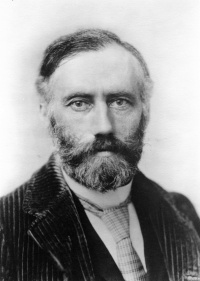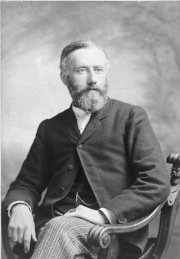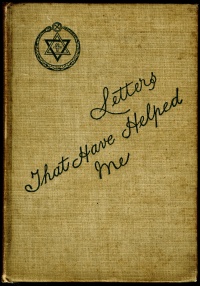William Quan Judge: Difference between revisions
No edit summary |
|||
| Line 18: | Line 18: | ||
== Legal career == | == Legal career == | ||
After his schooling was completed, young Judge sought work in the legal profession. | |||
<blockquote> | |||
He eventually became a clerk in the Law Office of George P. Andrews, who later became Judge of the Supreme Court of New York... On coming of age, William became a naturalized American citizen in April, 1872, and was admitted to the State Bar of New York one month later. His industry, natural shrewdness and inflexible persistence commended him to his clients and he became, as time went on, a specialist in Commercial Law.<ref>Boris de Zirkoff, "Judge, William Quan" ''H. P. Blavatsky Collected Writings'' Volume I (Wheaton, Illinois: Theosophical Press, 1966), 472.</ref> | |||
</blockquote> | |||
By the autumn of 1874, when he first met [[H. P. Blavatsky]], he was employed in the law office of E. Delafield Smith, U S. Attorney for the Southern District of New York. He represented Madame Blavatsky in her divorce from [[Michael C. Betanelly]], and the divorce was granted on [[May 25]], 1878. | |||
In 1884, after returning to New York after his visit to the [[Theosophical Society|Theosophical Society's]] international headquarters at [[Adyar (campus)|Adyar, Madras, India]], "Judge found his financial prospects greatly improved. He joined the law firm win which Olcott's brother worked."<ref>Boris de Zirkoff, 473.</ref> | |||
== Theosophical work == | == Theosophical work == | ||
Revision as of 15:59, 3 May 2020
UNDER CONSTRUCTION
UNDER CONSTRUCTION
William Quan Judge was one of the principal Founders of the Theosophical Society in 1875. He provided superb leadership to the American Section until his untimely death in 1896, but left a body of writings that are among the clearest explications of the principles of Theosophy. See Judge writings.
According to Josephine Ransom,
WILLIAM QUAN JUDGE, was born in Dublin, 1851. He was brought up a Methodist, but early showed strong occult tendencies. The family migrated to New York, 1864. Judge became a naturalized American citizen at 21. He worked as a clerk at an early age as he had to be self-supporting. he married in 1874, and had one daughter who died of diphtheria, 1876. At the time of the formation of The Society he was a law clerk in the office of the U.S. Attorney for the S. District of New York. He was later admitted to the Bar, and made a speciality of Commercial Law. He was modest, unassuming, eager for occult instruction and ready to work. Though at first H.P.B. objected to Judge becoming a Councillor, yet he won her friendly regard and kept it. He developed leadership, and became one of the most important figures in The Society. Then difficulties arose, and he led the secession of the majority of American Lodges, 1895. He passed away 1896.[1]
Early life
Foundation of the Theosophical Society
Legal career
After his schooling was completed, young Judge sought work in the legal profession.
He eventually became a clerk in the Law Office of George P. Andrews, who later became Judge of the Supreme Court of New York... On coming of age, William became a naturalized American citizen in April, 1872, and was admitted to the State Bar of New York one month later. His industry, natural shrewdness and inflexible persistence commended him to his clients and he became, as time went on, a specialist in Commercial Law.[2]
By the autumn of 1874, when he first met H. P. Blavatsky, he was employed in the law office of E. Delafield Smith, U S. Attorney for the Southern District of New York. He represented Madame Blavatsky in her divorce from Michael C. Betanelly, and the divorce was granted on May 25, 1878.
In 1884, after returning to New York after his visit to the Theosophical Society's international headquarters at Adyar, Madras, India, "Judge found his financial prospects greatly improved. He joined the law firm win which Olcott's brother worked."[3]
Theosophical work
William Quan Judge served as editor of the periodical, The Path, from 1886-1896. Quoting from the first issue, April 1886, Judge gives a reason for producing the publication: "to try on the one hand to point out to their fellows a Path in which they have found hope for man, and on the other to investigate all systems of ethics and philosophy claiming to lead directly to such a path, regardless of the possibility that the highway may, after all, be in another direction from the one in which they are looking."
Writings
See Judge writings.
Correspondence
Mr. Judge conducted an extensive correspondence with Madame Blavatsky, Colonel Olcott, A. P. Sinnett, Josephine Cables, and other members of the Theosophical Society. Many were published in The Theosophist and The Path, in these compilations:
- Judge, William Quan, and Julia Keightley. Letters That Have Helped Me . Available at Theosophical University Press Online. These letters form a conversation between "Jasper Niemand," the pseudonym used by Julia Keightley, and "Z," representing Judge. See also these sources: Theosophy World, ULT, London, and Hathitrust.
- Mavalankar, Damodar K. Damodar, The Writings of a Hindu Chela compiled by Sven Eek. See also Biographical notes. Originally published in 1940 by Theosophical University Press, Point Loma, California. Six letters written to Judge by Damodar K. Mavalankar are reproduced from originals held in the Archives of the Theosophical Society based in Pasadena, California.
- Bowen, Patrick D. and K. Paul Johnson, eds. Letters to the Sage: Selected Correspondence of Thomas Moore Johnson Volume One: The Esotericists. Forest Grove, OR: The Typhon Press, 2016.
Death
Mr. Judge had been ill for some time, from lingering results of Chagas disease (often erroneously referred to as Chagres fever) contracted in Venezuela. His friend Ernest Temple Hargrove wrote to Dr. J. D. Buck early in 1896:
I think that Judge is ten per cent weaker than when you saw him. Today and last night his cough seemed rather better; the mucus came away more easily. But he can hardly walk. He asked me last night "use your intuition. How long do you think this can last?" I said "If it goes on not more than a week." That was in reference to a crisis through which both he and I thought he was passing. For the drop was very sudden--ten percent in a day--yesterday. I do not know what caused it; nor does he. There is nothing else at all now. He gets more sleep now during the day.
Truly, even to the lay eye, it is a case full of contradictions, and it is impossible to take any view or form any opinion that is not flatly denied by facts within the next 24 hours. I should not be surprised at anything; not even at seeing him improved 20 per cent in a day.[4]
Mr. Judge passed away on March 21, 1896 in New York.
Tributes and honors
The William Q. Judge Library is at the headquarters of the Temple of the People in Halcyon, California. B. P. Wadia established the William Quan Judge Cosmopolitan Home for university students at the Indian Institute of World Culture. It was a hostel based Theosophical principles.[5]
Many colleagues have written of Judge:
Katherine Hillard
Some little time elapsed before I learned to recognize, under that quiet and rather insignificant exterior, the wisdom, the practical common sense, the humor and the independence of the man. Day by day I learned to know him better, and to trust him more...
To the mystical element in the personality of Mr. Judge was united the shrewdness of the practical lawyer, the organizing faculty of a great leader, and that admirable common sense which is so uncommon a thing with enthusiasts. . . . And blended with the undaunted courage, the keen insight, the endless patience, that made his personality so powerful, were the warm affections, the ready wit, the almost boyish gaiety that made it so lovable.[6]
Obituary in Mercury
Mercury, the journal of the American Section of the Adyar Society published this gracious and conciliatory obituary:
On 21st of March William Q. Judge quitted this sphere of activity. The news saddened all for every heart kept a shrine sacred to the well-beloved co-worker of H.P.B. We remember only his virtues, which were many, his talents which were great, and we know that the good he did for the many years he labored as the Vice-President of the T. S. and Secretary of the American Section will bless his name for all time. All honor to his memory.[7]
Additional resources
Articles
- Anonymous. "William Quan Judge". From Eclectic Theosophical History, June 2006.
- Anonymous. "William Quan Judge." The Canadian Theosophist 20:2 (April 15, 1939), 35.
- Van Mater, Kirby. "William Quan Judge: A Biographical Sketch." williamquanjudge.net. Reprinted from Sunrise Magazine, April/May 1996.
- William Quan Judge page on Theosophy.net.
- Articles by William Quan Judge at Katinkahesselink.net.
- Anonymous. "William Quan Judge." The Canadian Theosophist 20:2 (April 15, 1939), 35.
Notes
- ↑ Josephine Ransom, A Short History of the Theosophical Society (Adyar, India: Theosophical Publishing House, 1938), 112.
- ↑ Boris de Zirkoff, "Judge, William Quan" H. P. Blavatsky Collected Writings Volume I (Wheaton, Illinois: Theosophical Press, 1966), 472.
- ↑ Boris de Zirkoff, 473.
- ↑ E. T. Hargrove letter to J. D. Buck. Dated "Thursday, 1896." Cincinnati Theosophical Society Papers. Records Series 20.02.01. Theosophical Society in America Archives.
- ↑ W. Dallas TenBroeck, "Biographical Notes on Sri B.P. Wadia" Keeping the Link Unbroken (Theosophical Research Monographs, 2004), 120.
- ↑ Katherine Hillard, "Why I Became a Theosophist" Theosophical Quarterly (July, 1909), 59-61. Available at Blavatsky Archives.
- ↑ J. Helen Smith, "Obituary" Mercury 2.9 (April, 1896), 276.


